What is the best time of day to work out? A lot of people are worried about whether they’re lifting at the “wrong time” of day and it’s not surprising because there’s a lot of conflicting advice on this subject. On one hand, the conventional wisdom says you should train in the morning so you start your day on the right foot physically as well as mentally. Some trainers make a good point about that when they say if you train in the morning, you’re not only less likely to blow off your workout later in the day, you’re more likely to stick with your diet the rest of the day so you stay consistent with the good start you had.
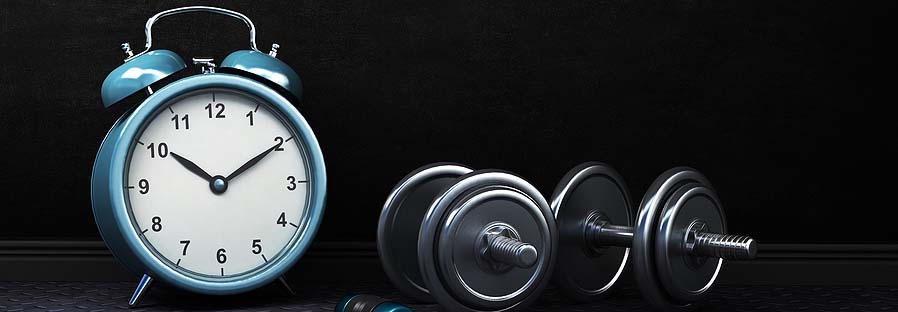
On the other hand, studies show that maximum strength and power is lower in the morning and that muscle strength, muscle power and sprint performance peak between 4:00 p.m. and 8:00 p.m. There have also been some interesting analyses done in sports, with more world records broken in the late afternoon and early evening. These are some of the reasons why you might hear coaches say it’s better to do maximum strength, power and other intense training later in the day.
But the real answer isn’t that black and white, though it is simple. If you look at all the research in the context of who was studied, how long they were studied for, and what their goals were, or you just look at your own experience to see what works for you, you’ll probably reach the same conclusion: the time of day you lift is not the most important factor in your success – it’s one of the small details – and you shouldn’t stress over it.
Why do some studies show a difference in performance with different training times?
One explanation is circadian rhythms. We know that a variety of psychological and physiological functions can change based on the time of the day. Exercise scientists are obviously interested in this because athletic performance in professional and Olympic sports is a big deal, so this has been studied a long time.
Some of the researchers noticed that the increase in strength and power in the late afternoon paralleled circadian changes in body temperature (which also peaked in the late afternoon). The theory is that the increase in core temperature has a passive warm up effect which loosens up connective tissue, reduces muscle viscosity, enhances metabolic reactions, and increases the speed of muscle contractions.
Studies have also found that tendons are stiffer in the morning. Even the muscle architecture itself (the arrangement of muscle fibers) is different as the day goes on. Dr. Stuart McGill, a professor of spine biomechanics, has suggested that some exercises (involving bending and twisting) should be avoided within an hour of rising from bed. He says the discs are filled with fluid at that time, which magnifies the stresses placed on the spine.
Basically, most people are cold, tight and their nervous system is half asleep first thing in the morning, but later in the day they’re warmer, looser and more neurologically awake because they’ve been up and moving for a while.
That means higher performance in the afternoon or early evening and lower performance in the early morning. There are at least a dozen studies showing that maximum strength and power is about 5% to 10% lower in the morning compared to the rest of the day and the difference could be as much as 21% depending on the population, the muscle groups involved and the type of training program. This is called the morning neuromuscular deficit.
Other researchers have speculated that the difference in performance is due to hormones
This hypothesis has less support, but hormone levels do fluctuate through the day. Testosterone is important for muscle growth and there’s some evidence that it rises more after a late afternoon training session than it does in the morning. The stress hormone cortisol peaks in the morning and decreases later in the day. Natural cycles of growth hormone release are influenced by the time of day as well.
Some experts recommend pm workouts for this reason alone – circadian differences in hormones or how training at different times might affect hormone release differently. But the research has always been mixed about how much short-term hormone fluctuations affect performance, and more important, whether they affect long-term results in muscle growth and strength increase at all.
Even if circadian rhythms and hormones are both involved, the time of day you train probably doesn’t matter as much as a lot of people think, especially when your goal is building muscle or general fitness or health. So now let’s take closer look at why.
First of all, you have to consider the type of training – are we talking about endurance, maximum strength, power or muscle growth?
The research on how circadian rhythms affect aerobic exercise is inconclusive. With moderate and longer duration (endurance) workouts, what time of day you do it doesn’t seem to make much difference.
The research on maximum strength and power is extensive, but what about gaining muscle – that’s not the same goal. In the past, this topic had been studied the least (I guess they were more interested in Olympic and pro sports than body building), but fortunately, that’s changing.
One of the first studies to look specifically at muscle growth (rather than power or maximum strength) was done at the University of Jyvaskla in Finland. 24 men with an average age of 23 were recruited as subjects and split up into a morning group (7:00 a.m. – 9:00 a.m. training ), and an afternoon group (5:00 p.m. – 7:00 p.m training) plus a control group.
The study was 10 weeks long, so they weren’t just looking at how time of day affected performance or hormone levels at a single workout – they were doing a weight lifting program and then measuring muscle size after almost three months of training. At the end of the study, there was no significant difference in muscle growth.
In 2017, another study was done at Comenius University in Slovakia that was again aimed at seeing how training time of day affected muscle growth. The subjects were 32 males, between the ages of 20 and 30, and they were also split into morning and afternoon groups. After 11 weeks, both groups gained muscle, but there was no significant difference in muscle gains between groups. There was also no difference in testosterone and cortisol response.
Regularity in your training schedule is important
Even when the goal is maximum strength and power, one thing we’ve learned is that your body can adjust to morning training. After 5 weeks of switching from afternoons to mornings, performance in morning workouts can increase to the same level it was when training later in the day.
In a review from the Journal of Strength and Conditioning Research, where the authors looked at all the studies put together, one of the main findings was that if you’re an athlete and you do your training at the same time of day you usually compete (your game time or meet time), you’re more likely to perform the best.
In other words, if you compete in the a.m., it’s ideal to train in the a.m.. If you compete in the p.m., train in the p.m., if you want optimal results. If you’re not training for competitive sports, that’s another reason not to worry about timing.
One way to optimize your performance might be to avoid haphazard or random training times. Also, keep in mind that if you change to morning training after being used to afternoon or evening training, you might see a decrease in performance at first until you get used to it. If you pick one time – any time – and you stick with it, eventually, your performance will equalize, so in the long run it, the timing may be less important than regularity.
Inconsistent training times could also explain why some studies said lifting later in the day is better – many of the subjects may have been used to training at that time.
Also, from a psychology point of view, when you consistently repeat a behavior, that’s how you ingrain habits. When you’re just starting out, if you don’t commit to one training schedule, you’re going to have a tough time making your training something you do automatically without needing willpower.
Gender and age might be a factor too.
In a 2018 study (Krycmarova), the researchers decided to recruit untrained older females as test subjects. The reason is they noticed that previous research on strength used trained athletes as subjects and the studies on muscle growth used younger men as subjects.
This study was designed to see how women in their sixties responded to a 12-week training program with one group training in the morning and one group in the evening. Both groups did whole body strength training with 3 sets of 10-12 reps per exercise and 2 to 3 minutes between each set.
The time of day didn’t have any major effect on any outcome including muscle growth. But there was actually a non-significant, yet measurable effect that favored increased muscle mass in the group that trained in the morning.
Does this mean that older women should lift in the morning to gain muscle, or that research is always contradicting itself? No. Actually this is more evidence that there’s no single best time to train and that you should decide for yourself when to train and that it’s based on a lot of different factors.
Put together, what does all the research conclude?
In January of 2019, a group of researchers lead by Jozo Grgic published a meta-analysis of eleven studies to see what all the best science data put together said about morning versus evening training and the effect on strength and muscle growth. The authors concluded:
“The results indicate that if you consistently train at a given time of day, the body adapts so that muscle development is similar regardless of whether you do morning or evening workouts. Take home: There is no ‘best’ time of day to work out; train when it best fits your lifestyle.”
In a 2022 a systematic review (Janssen et al) the researchers looked at the effect of training time of day on health outcomes. After analyzing 35 studies with 17,259 participants, the authors concluded, “There is no consistent evidence that physical activity at one time of day provides more favourable health benefits than physical activity at a different time of day.”
Other factors: Psychology, convenience, personal preference and sleep
There may be advantages to different training times based your age, your goals and the type of training you’re doing, but in the end, it comes down to personal preference, convenience and psychological factors as much as it does to anything biological.
Many people find that training in the morning helps them stay consistent. One positive behavior or achievement in the morning can set a positive tone for an entire day.
Some people also find that night time workouts are easier to blow off, because they’re tired, willpower-depleted, stressed or work or family issues come up and take priority (or, for some people I know, the temptation of happy hour is more appealing).
Some people say that if they train too late at night (like 10 or 11 p.m.) it disrupts their sleep.
Some people train when they train because it’s the only time they can fit it in, or it’s just when they prefer to train and that’s fine.
What’s the bottom line?
You don’t have to follow any rigid rules made by training experts or based on a single study that may not have looked at the whole picture. Instead, you should customize your training time just like every other part of your plan.
When choosing a training time, some competitive athletes might want to consider what the research says because circadian rhythms can influence training results in some cases. But ultimately the best time for you to work out is the same that a lot of common-sense trainers have been saying all along:
1. Train at the time when you feel the strongest and perform the best.
2. Train at the time you feel the most energy physically.
3. Train at the time when you feel the most alert and focused mentally.
4. Train at the time when you can stick with it the best, because it fits into your lifestyle.
5. Once you’ve chosen a training time, if possible, stick to it consistently so it becomes a habit, plus consistent training times may improve response to training.
Train hard and expect success!
Tom Venuto,
Author, Burn the Fat Guide to Flexible Meal Planning For Fat Loss
Founder, Burn the Fat Inner Circle
PS. What about me? Over the years, I’ve trained at almost every hour of the night and day. The worst lifting time for me was 6 am. I had to get up at around 5:20 am to be ready for that… but I was never ready. I was a grouchy, miserable SOB and the only reason I made it is my training partner (who one time, broke into my apartment and literally dragged me out of bed). We were both prepping for a contest; we both competed. I won the middleweight and overall, but I hated every minute of lifting at those ungodly hours. Cardio before breakfast – especially right at home – at 6 or 6:30 in the morning, I could always manage.
For a while, I did a stint of lifting at 7:30 am (lifting) with my trainer Richie (“the master of pain” – who enjoyed getting up at 4 am to come torture his clients before the sun had risen) . That was better (time to drink more coffee). But not much. I took that 7:30 – 8:30 am time slot begrudgingly. Second least favorite time for me has been in the evening – after dark, with starting times after 8 pm. I feel like I’m physically dragging at that time and my mind is more scattered, especially after a high-stress workday. Afternoon training times – starting between 1pm and 4 pm have worked very well for me, and as a plus, the gym is empty, (so I can curl in the squat rack like a good meathead, and there’s no one there to yell at me). I have only been able to do that in recent years because my previous career in the gym business had me working afternoons and evenings.
The best time for me ever was in the late morning – starting time around 10 or 10:30 am. That was the time for me that I felt strongest, most energetic and most mentally ready and focused. I had time to already have a couple meals in me, plus there was enough time to drink copious amounts of Starbucks :). Being self-employed does help, because you can train any time you want… experiment… and find what works best. I also agree with the latest research: I’ve been guilty of training at miscellaneous, haphazard times, and I think that sometimes hurt my mental readiness and physical performance.
PPS. How about you? If you have experimented with multiple training times, what did you find was the best time for you? How did it affect your: 1. Workout performance, 2. Eagerness/willingness to train, 3. Consistency over time and 4. Your results over time? You can post your comments below – would love to hear from you.

Tom Venuto has been a trusted natural bodybuilding and fat loss expert since 1989. He is also a recipe creator specializing in fat-burning, muscle-building cooking. Tom is a former competitive bodybuilder and today works as a full-time fitness coach, writer, blogger, and author. In his spare time, he is an avid outdoor enthusiast and backpacker. His book, Burn The Fat, Feed The Muscle is an international bestseller, first as an ebook and now as a hardcover and audiobook. The Body Fat Solution, Tom’s book about emotional eating and long-term weight maintenance, was an Oprah Magazine and Men’s Fitness Magazine pick. Tom is also the founder of Burn The Fat Inner Circle – a fitness support community with over 52,000 members worldwide since 2006. Click here for membership details
Scientific References:
Drust B, et al, Circadian rhythms in sports performance – an update, Chronobiology International, 22910, 21-44, 2005.
Grgic J, Shoenfeld B, et al,The effects of time of day-specific resistance training on adaptations in skeletal muscle hypertrophy and muscle strength: A systematic review and meta-analysis. Chronobiol Int. 2019 31:1-12.
Janssen I et al, Timing of physical activity within the 24-hour day and its influence on health: a systematic review, Health Promot Chronic Dis Prev Can, 42(4):129-138, 2022
Krycmarova et al, The effects of 12-week progressive strength training on strength, functional capacity, metabolic biomarkers, and serum hormone concentrations in healthy older women: morning versus evening training. Chronobiology International – The Journal of Biological and Medical Rhythm Research, 9:1-13. July 2018
Sedliak M, et al, Morphological, molecular and hormonal adaptations to early morning versus afternoon resistance training. Chronobiology International – The Journal of Biological and Medical Rhythm Research, 35(4), 2017.
Sedliak M, et al, Effect of time-of-day specific strength training on muscular hypertophy in men, Journal of Strength and Conditioning Research, 23(9), 2451-2457, 2009.
Chtourou H, The effect of training at a specific time of day: a review. Journal of Strength and Conditioning Research, 26(7):1984-2005, 2012



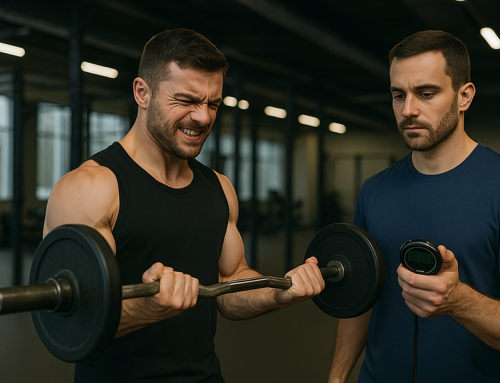
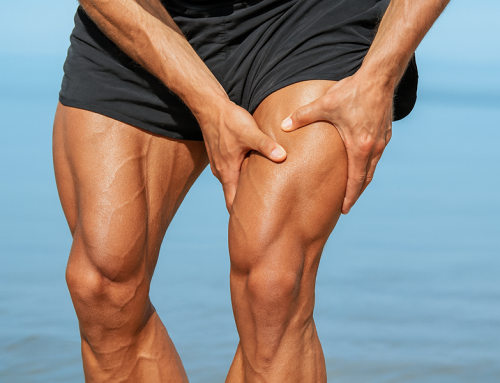
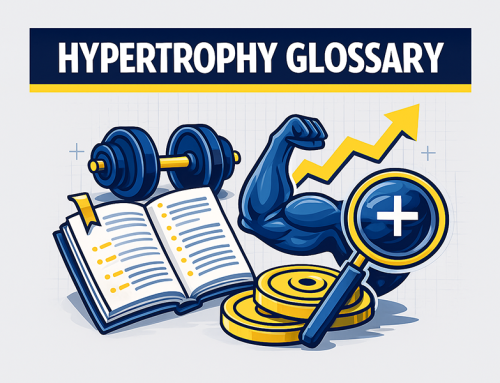
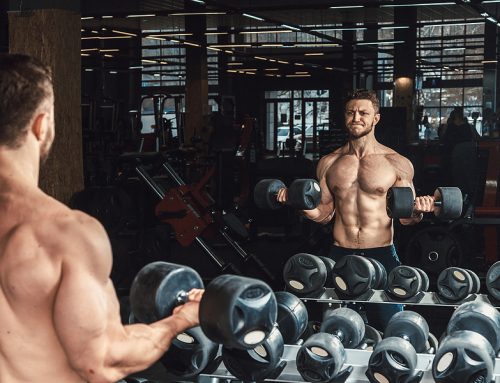
I very much appreciate your easy to read and understand, plain style of writing about the research. Being a novice, Tech jargon can loose me :)
Somebody else said the best times to eat carbs are in the morning and after a workout. Maybe best is to to do a workout in the morning and then eat the carbs.
For me it’s whenever I can force myself to do a workout. Which mostly means find a long block of time and remember to do it. My gym is in my basement.
If I spent 1/10th the time exercising as I do reading about exercise, I’d be in great shape. :-)
“If I spent 1/10th the time exercising as I do reading about exercise, I’d be in great shape.”
I love your brutal honesty! I think this phenomenon is quite common and frequently leads to “paralysis by analysis.” I know I have fallen prey to this mindset more often than I care to admit which is why I can relate to what you are saying.
It’s a much easier to read about exercise then it is to put one foot in front of the other on a consistent basis :)
I’ve been working out with weights consistently since 1978 and have tried workouts at all different times of day. Due to my current work schedule, for the past 15+ years I’ve found lunchtime to be the best, because 1) I am motivated and have energy, and 2) the gym is usually not crowded, so I can get in and out relatively quickly because I don’t have to wait for machines. The slight downside is that I’m occasionally tired in the afternoon, but that’s a minor inconvenience I’m willing to deal with.
Especially now in the winter I would find it hard to motivate myself to head off to the gym in the evening when it’s dark and cold outside and my body is telling me to go home and eat and keep warm.
Admittedly I am very fortunate to have a work schedule that allows me to train at lunchtime, and realize that not everyone has this luxury.
Consistency is the key word. I’ll be hitting 55 next week and now am really reaping the benefits of having worked out so regularly over all these years. It’s like putting a few coins into a piggy bank – it doesn’t seem like much on a single day, but if you keep doing it and count all those coins years later, you’ll be glad you did.
Trainging at the afternoon is the best for me,I work out at 3 to 5pm around theese times and I perform my best, morning work out is bad unless if its cardio for buring fat and still it wouldn’t be as much agressive as late afternoon, plus from my personal experiance I have more compliance in nutrtion when I workout at afternoon as I eat my carb before and after. And I get satisfied and full and i weak up lighter in terms of body feeling, when I did work out at morning, I used to mess with my meals and cheat and feel hungry all the time and it ends my energy where I feel sleepy later through the day. What I think is there is prameters for every thing but all human body are not the same, it like finger prints, every one is diffrent and every one has a uniqe point where they are body can give them the best, just try to understand ur body and try diffrent time and u wil het the “aha” answer ;)
For years i trained the hours between 4 pm and 7 pm. For the last 3 months i have been training approximately noon. One more thing that i tried training between 7 am and 8 am. I can easily say that i saw no significant changes. So according to my idea: correct time is the best time for yourself. In modern times people generally find hard to get a specific time for exercise. If you work during the day for example: you have to train late afternoon or early afternoon. If you work at night, it is quite hard to have a good performance in the early morning after the work.
So people themselves should choose for the best time for exercise. It is all about personel experience. Also there are a lot of things that effect performance much more than training time.
I find that I have to think through my schedule every day based on all of the things that need to be accomplished first. That determines when I will work out and in what order I will eat during the day, for example making sure I have starchy carbs before and after the workout.
Typically, when my schedule is “normal”, I work out around 4:00 pm every weekday. But if there is an unusual amount of busyness scheduled for the afternoon, I might get up and get the workout done first thing in the morning, so that I don’t end up missing my workout altogether, as the day progresses.
I also keep in mind that I typically get into a post-workout-exhausted state about 4 hours after a hard workout. So when that strikes around 8:00 pm, I am ready for a great night’s sleep! If I workout in the morning, I hit my slump at lunchtime, making for a long afternoon. I have been known to take a catnap on those days though.
I’m the same as you, Tom. I wake up at 7-ish, check my email, answer clients, and fight whatever fires came up since last night, while I drink a large coffee with two shots of espresso, as well as take my L-Tyrosine. By 9:30 or 10:00, I’m good to go. (I train fasted.)
Yup, being self-employed helps. But if I were to be in a job, I would have worked out on my lunch hour, or worked in a job that either allows telecommuting or working later in the day — like 10-6 or later, rather than 9-5 or earlier.
FWIW. ;)
My workout schedule is based on my training partners work schedule. Most days we train at 10:30 am. Some days at 3pm and there are usually 4 workouts through the month when we train at 8pm.
Sometimes I’m tired in the evening and I don’t perform well. Other times I ROCK the workout.
Personally I like changing up the times, but I find the morning or mid-afternoon to be my best times.
Mostly because of the demands of my work schedule, I am at the gym in the early evening (6 PM). I’d much rather start the day off with exercise, but I have to be at work at 7 AM, with an hour commute to get there. On the weekends or vacation, I get up and ride my bicycle first thing in the morning.
I typically wake up around 5 am, check email, get some work started, and end up training around 7 am. With the fact that I work for myself, my schedule remains flexible so if for whatever reason I cannot train at this time (which is my preferred time) I move it up to 10am. At 10 am I get better performance due to the fact that I have a couple of meals in me. However, training at 10 am consistently does not work for me since I typically get busy at that time with my business day.
The performance of an afternoon workout (around 5 or 6 pm) really depends on how my day has gone. After a long day, performance may suffer. Thus, I rather get it done earlier in the day plus the early workout gives me a sense of accomplishment early on and puts me in a very positive mood.
When I used to work as an engineer, I had to still wake up at 5am and I was at the gym by 5:30am. While not optimal in the sense that this was really a rude awakening and my performance was not as good as a 10am workout, I still made awesome gains from doing this.
With that said, for me, the best time is 10 am but due to my schedule I do it a bit earlier 7 am. Morning time is my preferred time as like I said, it starts my day on a positive note.
Best!
HR
I think the best time to train is when you are going to get the most out of your workout. If I don’t workout first thing in the morning I can talk myself right out of it and I do stay on track better for the rest of the day.
Very interesting research. However I have one very valid point. How can you argue that the best time of the day to workout IS NOT at the point when you have the most energy. Some people are morning people, some people are night people. You should always workout when you are at your peak energy.
Have trained at all times of the day. Evening training has always been more productive for me.. I think mentally when everyone else had gone and I can ‘pump up the vibes’ it is easier to get the most out of each session.
It’s also easier to pay full attention to my nutrition that way.
Also feel much stronger and warm up easier at night after a day of moving around a gym and handling weights.
I trained at every possible time from 4am to 10pm and would NEVER not eat before weights session even if it meant getting up at 3 am to ensure I didn’t feel sick during the session. I think any time from 3 hours after waking up to 12 hours after waking is perfect as your more likely to push yourself and thus get better gains. How hard you train plays a bigger part then the actual time.
Thanks for saving me the endless hours of searching for the best time to work out. Me? My body feels the best between 10am and 12pm, so I like to do my workouts during that time frame. Another plus is during that 2 hour time slot between the morning rush and the lunchtime crowds, I can get a lot more training done when the Gym seems to be at it’s slowest.
Obviously, the best time for someone to train is whenever it can consistently fit into their schedule, and for most of us with jobs and family we need to work around that.
I have had great results during competition prep by training twice a day. The first session was for an hour starting at noon, then back for another hour from 6:30 pm.
By splitting training this way I was able to split my carbs into four meals a day around my workouts. Also, I was able to work at a high intensity for both sessions.
It was pretty hard at first, but within two or three weeks of starting this training regimen I started to love it and I will certainly incorporate this in future contest prep.
Wow, I agree on the early morning workouts! I had a friend that I used to workout with several years ago, and he was an early morning person. I hear ya on the miserable SOB in the morning! That was ME! I find my best workouts are right after work, before dinner time, usually around 5:30 or 6pm. It also seems to help with the stress of the day, since my job can pile a lot of that on with tight deadlines. That time also has a tendency to curb my appetite a bit, and make me feel like choosing something more healthy and a bit lighter, since evening meals seem to be my bane. If I’m not working out (like lately, yes, I’m guilty right now), I tend to pick all the wrong foods and eat more than I would had a done SOME kind of activity, whether it’s cardio or weights! Interesting article, Tom! Thanks!
For me, on weekdays it’s right after work 5:30 home by 7 for dinner. Weekends it’s late mornings. The big thing is to feel right!
I am going on 58 and am in Afghanistan, but live in Texas. I have trained at 4-am but only cardio then back in the afternoon from 2-4 weight training. I have cardio am and pm every other day with a rigid weight training program on in between days. I have designed for me a three phase workout, each phase lasting 6 weeks and have had great results. Guidance for nutrition from the BFFM program and the above have made my energy and strength level way above what I had in my 20’s. I also used part of Toms saying as “Have Faith, work hard, train hard and expect success.
The best time for me to train is in the afternoon between 2:00 and 4:00. I think this time works best because I’ve been awake for several hours, so my body is very warmed up, and I’ve gotten two or three meals in me. Being self-employed allows me to consistently work out at this time.
When I had a corporate job I would usually train between 8:00 and 10:00, and this worked pretty well for me. The worst time for me to train is in the early morning not long after waking up.
I like to do my workout in early mornings and I wish I could spend about 20 % of my time of surfing about exercise on actual exercising …….
i actually knew that cortisol is higher in the morning for apple shaped people who also tend to rise very early naturally because of their hormonal response. the pear shaped people should have cortisol levels higher in the evening. in fact, they tend to stay awake longer at night watching tv or reading because they can’t fall asleep. but in general cortisol levels should peak around 10am this is why one should have breakfast before 9am in order to prevent fat storing.
also pear-shaped people should avoid eating carbs in the evening because of high cortisol levels, and apple-shaped people should avoid them in the morning for the very same reason.
so because of the cortisol levels it is recommended to work out in the morning for the apple-shaped people, and in the evening for the pear-shaped ones since they feel more active at that time of the day and can perform better.
but these are just studies… so…
Great article Tom! I really appreciated hearing what’s worked for you over the years. I find I’m at my best in the mid to late afternoon. That tends to coincide with actually having some time carved out from family & work commitments too. It’s really a balance between nailing all your workouts and carving out that time from your busy work and family life too.
Thanks Tom for the great info you always give out. My best training times have been in the morning from 7-10. I have also tried afternoons and evenings but found them to be tiring from the stresses of the day and have not had the focus the morning workouts have had. As an older person stretching and warm ups have become a vital part of every workout to be in a position for maximum muscle performance. Thank you
I find first thing in the morning is absolutely impossible for me. I’ve tried it and having to get up at 4-5-6 am I do not have the energy to do the work out right. Your stiff, groggy etc.
In the later afternoon or evening is horrible also, because your day has gone by you have to think about kids, cooking etc, and the last thing I want to do is work out. Your tired. I only do this if its absolutely necessary, but I don’t like it. When I was younger, get off work, hit the gym and do a 2-2/12 hr work out and feel great! Not anymore.
So I like to do it in the morning around 10 after breakfast but before 12 when my son takes a nap. He has his snack and then works out with me. I have been fueled by a good breakfast, and my coffee sometimes. Most times I’m fueled by my homemade veggie juice with walnuts, yum! Then I’m pumped and ready to go!
I ran two mornings in a row and strained the tendons in my foot, i never knew why it happened or if i was running on uneven surfaces, but ur article explains it all. Now i have not been able to run for a month and going to physio twice a week. My body is best ready for action betweeen 12pm and 5pm…….i am well fed and feel good and muscles warmed up and tendons stretched thru the day. When you come homw and shower its time to eat a recovery meal and relax for bed……i love it!!
Personally I believe that the best time to work out is whatever time you have available at your disposal because every body has different schedules and those schedules are constantly changing.Especially for people with children.The most important thing is that people not allow the desire of a perfect workout or a perfect workout time to overpower their moral character (: And if you are married and have children,do not stress out and use your spouse or your children as an excuse.Because there are endless ideas on how to *workout together* (: as a married couple and even as a family (: I would expand on this but I have to *RUN
Worst in the morning, better in the afternoon after a good nap, best at noon! Worked like a charm years ago with my trainer. Body fat went from 33% to 16%. I was in theee best shape of my life!
I normally get up at 4am to run…I love starting my day that way, but it is tougher in the winter. This past summer I had gotten into a routine of running around 5:30pm, after work, at home on the treadmill, while dinner cooked but took a week for away vacation and just could not get back into the routine. Strength training morning or evening.
Mornings. Simply because I KNOW if I put it off til evening, most times I simply will not get it done. I am up at 6am regardless of workouts, so it isn’t like I am getting up JUST for that. But there are times I don’t get home until 10 – 11pm and I know for a fact, I am not working out at midnight! I think early afternoons would work for me, but my work schedule prevents that.
I am 66 years old and have worked out regularly since the 8th grade, when President Kennedy started a fitness program for schools. I have had times where I wasn’t as consistent as I should have been, but I still work in the flooring industry in sales and installation. I am considered a freak by most people, in that I work alone, carrying my own material up stairs to the many beach houses in the area. (The most weight I have had on my back in recent years is 350 lbs of flat folded carpet. My record is much higher than that. In recent years I go through periods where my workouts tire me out if I have started up after a dormant period and have little energy left. My workouts now consist of primarily 900 crunches and 190 varying pushups. My waistline is larger (love handles have increased my waist size about 5 inches 37) , yet I still have some definition in my abs. Morning works best, but energy seems to be the biggest issue in my work outs. Any suggestions?
5:00AM, Start the day right. Gym is empty and equipment is available. Trying to work out after working all day makes for too many excuses. Things come up that take the place of gym time later in the day.
I really want to know the best time for exercise because i exercise in the morning, each time i try afternoon & night i feel so sleep & forced to take a nap.
Being an ex pro female soccer player I have trained at many different times of day. I have to say my best time to workout is in the morning, just about anytime. Even if it’s 6am. During university preseason training our toughest physical training was at 7am and I always did quite well. A also had no problem with the evening training sessions in Europe. I have to say I’m the opposite to you, the time between 1-4 I have not motivation and I feel sluggish. I really have to push myself to train and to train hard. I think we are all made differently, the key is to find what works best for you. If your schedule changes once and a while, suck it up and train at that time that doesn’t quite fit you. You’ll feel good at the end!
I’ve experienced training at 7am, 10am, 12pm, 2pm and 6.30pm. I enjoyed training at 10am the best. It allowed me to have my breakfast and gave it time to settle before training.
Nick
For me, the best time (and the most convenient) is as soon as I am home from work (5.00 pm). My mind is still alive and racing from all those 8 hours of code crunching and I use this to my advantage by going straight into physical activity.
I did try experimenting with morning workouts but felt it was a chore and always tried to get through it somehow without actually putting any effort into it.
Good topic Tom . I’ve experimented with training at different times of the day and found the worst time for me was later in the day like in the evening after work or worse, after dinner.If I trained too late in the night I’d then have a hard time falling asleep later and consequently would not get a good night rest .I also found it hard training at the end of the day after coming home from work because it was the end of the day and the last thing I wanted to do was get up again after I’d just sat down, I really didn’t have a lot of energy or motivation to work out especially when my sleep pattern was at risk. The best time for me was in the morning anytime between 8 – 10:30. I felt very fresh and focused and I’d have at least 1 – 2 meals inside me already so my energy was there. I could work out hard and have the rest of the day to recover .
yes, I am curious..what is the best time to work out? I have worked out at all hours of the day ..
I can do cardio first thing in the morning, but when it comes to strength training I prefer to wait until after work when I am fully warmed-up after moving all day.
There are the two option doing exercise time. First is morning and second is evening, but best is morning. In morning body is relax and tension free. We provide some important instruction for morning and evening exercises. You can see on our website.
3PM is my go to for weights. LISS cardio whenever I can get it in. I switch my weights to mornings the last week or two before a powerlifting meet if I’m in an AM flight. I find this acclimates me